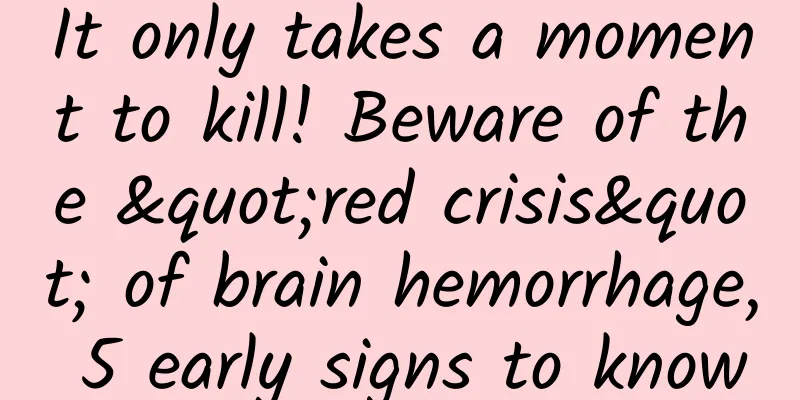It only takes a moment to kill! Beware of the "red crisis" of brain hemorrhage, 5 early signs to know

|
"Ouch, my head hurts, I'm going to faint!" Who would have thought that this was the last sentence left by "Yunnan Million Fans A Kui" in the world. After realizing that his body was sending out danger signals, he hurriedly went offline and his team members rushed him to the hospital. Unfortunately, he was diagnosed with a sudden cerebral hemorrhage and was rushed to the ICU for emergency treatment. However, after being in a coma for 8 days, Agui died at the age of 32. What exactly is cerebral hemorrhage, this “invisible killer” of life?According to Fu Yingxu, director of the Department of Neurosurgery at the Hunan Provincial Hospital of Integrated Traditional Chinese and Western Medicine (Affiliated Hospital of Hunan Institute of Traditional Chinese Medicine) , cerebral hemorrhage, also known as intraparenchymal hemorrhage, is a serious acute cerebrovascular disease. Its main cause is rupture of brain blood vessels, causing blood to overflow into the brain tissue. Statistics show that cerebral hemorrhage accounts for 20% to 30% of all acute cerebrovascular diseases. What causes cerebral hemorrhage?The common causes of spontaneous cerebral hemorrhage are hypertension and arteriosclerosis, and aneurysms and ruptured vascular malformations are also common. Lifestyle risk factors, such as being overweight, drinking, smoking, and using cocaine, can also increase the risk of cerebral hemorrhage. Agui had high blood pressure before, but he did not take this disease seriously. In addition, the live broadcast industry is quite stressful, so he often stayed up late to work, which eventually led to tragedy. What symptoms are warning signs of cerebral hemorrhage?Patients with cerebral hemorrhage generally have no prodromal symptoms, and a few may experience dizziness, headache, and limb weakness. After the onset of the disease, the symptoms reach a peak within a few minutes to a few hours. The severity of the symptoms mainly depends on the amount of bleeding and the location of the bleeding. Typical symptoms include: 1. Difficulty speaking and understanding: You may speak unclearly or have difficulty understanding what others say; 2. Numbness in the face or limbs: The face, arms or legs may suddenly become numb, weak or paralyzed, often on one side of the body; 3. Monocular or binocular visual impairment: sudden blurring or blackening of vision in one or both eyes, or the appearance of double vision; 4. Headache: Sudden severe headache, which may be accompanied by vomiting, dizziness or changes in consciousness; 5. Difficulty walking: You may stumble or suddenly become dizzy, lose balance or coordination. Diagnosis and treatment of cerebral hemorrhage?The diagnosis of cerebral hemorrhage usually relies on medical imaging techniques such as CT scans and MRI. Once confirmed, treatment measures should be taken immediately to prevent the condition from worsening. Treatments include: controlling blood pressure, preventing further bleeding, reducing brain edema, and treating the cause. In some cases, surgery may be required. In addition, medications are required for high intracranial pressure and hypertension caused by cerebral hemorrhage. Prevention and prognosis of cerebral hemorrhage?The prognosis of cerebral hemorrhage depends on the location and speed of the bleeding and whether it is properly treated. Some patients can return to normal life after treatment, while some patients will have long-term effects such as paralysis and speech problems, which may lead to fatal consequences in severe cases. Director Fu Yingxu of the Department of Neurosurgery reminds us that to prevent cerebral hemorrhage, we need to make changes in our lifestyle, such as controlling our weight, drinking less alcohol, not smoking, eating a healthy diet, exercising moderately, etc. We also need to have regular physical examinations and control our blood pressure and blood sugar in a timely manner. Let us always be vigilant against the "red storm" of cerebral hemorrhage, build a solid line of defense for life, and stay away from this terrible health threat.
(Edited by YT) |
Recommend
Should I lie down while taking medicine on the third day of medical abortion?
The third day after medical abortion is the most ...
The principle of easy pregnancy after biochemical
Biochemical treatments can cause great harm to th...
Dull pain in right abdomen at 27 weeks of pregnancy
The dull pain in the right abdomen at 27 weeks of...
Can I eat gluten during menstruation?
Menstruation is a critical period for female frie...
Reduce belly fat with just these few yoga moves
Yoga is a very popular form of exercise. It not o...
Can pregnant women eat motherwort?
When we see this name, we can think of it as a Ch...
What is retinal detachment and what are the dangers?
Retinal detachment is a common fundus disease, wh...
How long is the pregnancy?
In daily life, many friends who are preparing to ...
Women with deformed parts of this body are 80% likely to get cancer
Young women pay more attention to the shape of th...
How many days will menstruation be delayed if you stay up late
Irregular menstruation will directly affect pregn...
What nutrients does pineapple contain? What are the functions and effects of pineapple?
Pineapple is rich in nutrients, containing sugars,...
How much is the Heytea New Year's co-branded peripheral and where can I buy it? What is the Heytea Qingming Riverside Co-branded New Year gift package?
As we all know, Heytea is a popular milk tea shop...
What are the reasons for early or delayed menstruation?
In real life, many women have irregular menstrual...









